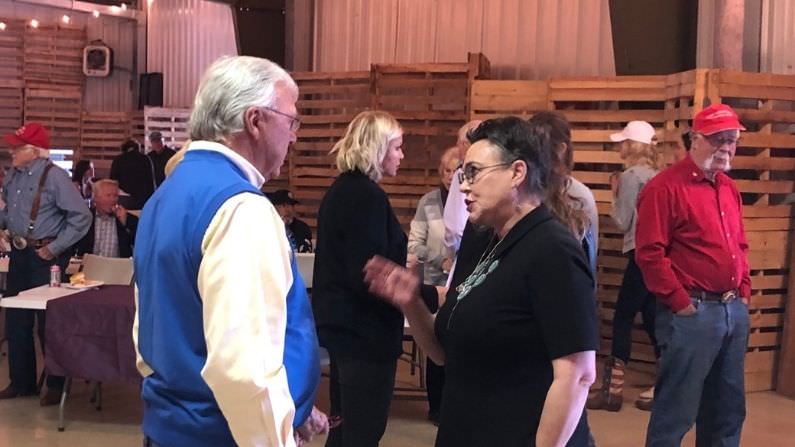Cheney Challenger Visits Teton County
Harriet Hageman, an attorney from Cheyenne and a candidate to unseat Rep. Liz Cheney in the 2022 congressional primary, addressed a crowd of about 60 people in Teton County Wednesday. Hageman began by introducing herself as a 4th generation Wyomingite with more than 30 family members still living in the Cowboy State. She also discussed her political philosophy by referencing two documents she said she carries with her at all times: The Wyoming and United States constitutions.
“I am proud to be from Wyoming and I am proud of what our history is. And I’m also proud of Wyoming for being as independent in this as it is,” Hageman said. “We have a lot of very independent-minded people. We understand our communities and our families, [we] understand that we are best at taking care of our families. Not the government. It isn’t for the government, especially. It’s not the federal government’s responsibility to take care of us.”
Hageman is considered a frontrunner to unseat Cheney because she was endorsed by former President Donald Trump nearly a month ago. Although Hageman was previously a delegate for Ted Cruz in the 2016 Republican primary and said Trump wasn’t the right candidate at the time, she fully endorsed the job he did in the White House while speaking to her potential constituents this week.
“The night that President Trump was elected was one of the greatest nights I ever had,” Hageman said to applause from the crowd. “He did what he said he would do.”
Asked by a crowd member asked about the 2020 election, Hageman said she has questions about whether or not it was legitimate, despite over 60 failed lawsuits challenging the results since Election Day. The Trump endorsement has led three other congressional candidates to drop out, and Hageman hopes Republican voters will coalesce behind her over the next 10 months to unseat Cheney, a political giant in the Cowboy State who’s already ahead in the fundraising battle.
Target Still Committed to Jackson
Rumors had been circulating on social media in recent weeks that Target, the big-box chain that previously announced it was building a new store in Jackson, was pulling out of their commitment due to staffing issues. KHOL reached out to Target, and a company spokesperson said the rumors are false. A 70,000 square-foot location is still in the works where the old Kmart used to be, but details about the opening date and what the shopping experience may look like for patrons are still not available yet.
Victor BBQ Suffers Fire Damage
A fire caused major damage to Big Hole BBQ in Victor overnight Monday and early Tuesday morning. The blaze was contained to the downtown restaurant, which was unoccupied at the time, according to the Teton Valley News. No injuries were reported, but the restaurant’s newly remodeled kitchen was severely damaged. The concentration of the fire suggests that a mechanical malfunction in the kitchen might have started it, but the official cause remains under investigation. Victor Mayor Will Frohlich stopped by to see the destruction Tuesday morning, and he said the fire is a blow to the community.
“You know, it’s always tough when you have something like this happen. Fires are truly devastating, whether it’s a business or a person’s home,” Frohlich said. “And Big Hole, to me, it’s a staple of this town, it’s a staple of the community. It’s truly been remarkable to see how quickly they grew and how appreciated they are as a business in our downtown core.”
Frohlich also said the city is committed to helping Big Hole fast track its redevelopment, but the restaurant isn’t likely to reopen anytime soon.
“It’s definitely structural. They won’t know for sure until the insurance adjuster gets there, but it sounds like the kitchen took the brunt of it, and it sounds like that, at a minimum, is a complete loss,” he said.
As of press time, a GoFundMe fundraiser to benefit Big Hole BBQ employees while the restaurant is closed has raised more than $8,200.
Local Electeds Hear from Human Services Organizations
The Teton County Board of Commissioners and Jackson Town Council heard from several local human services organizations at a joint information meeting Monday. Many nonprofit leaders discussed staffing, funding and housing challenges as sources for recent struggles, such as cutting services or hours. And Sharel Lund, executive director of One22, an all-encompassing financial and cultural assistance organization in Jackson Hole, said workers that stay here are often fighting to make ends meet. Demand for both food and rental assistance has steadily gone up since the pandemic.
“When we look at our rent assistance applications, and this is on average, the average household is paying $1,475 in rent, and bringing in $2,015 in income. That’s 73% of their income going to their rent. Obviously, that is not a workable situation,” Lund said.
After significant delays, the State of Wyoming has so far handed out about $100,000 in COVID-19 emergency rental assistance to Teton County to try and provide some relief to those struggling financially. Lund also said One22 distributed 25,000 meals to those who needed them in August. Many business and nonprofit leaders report not being able to raise their wages high enough to keep up with demand from prospective employees amid skyrocketing rents.
Indigenous Activists Discuss Work
The Wyoming Outdoor Council held a virtual panel with Indigenous female advocates from the Wind River Indian Reservation Wednesday. One of the women who discussed her work was Crystal C’Bearing, deputy director of the Northern Arapaho Tribal Historic Preservation Office. The office’s mission is to preserve the tribe’s cultural resources, and they work with state and federal agencies to do that. But C’Bearing said Wyoming is typically more difficult to work with than other states in the region and the federal government.
“Here in Wyoming, there’s about 32 tribes, I believe, that identify Wyoming as a territory. A lot of times BLM [Bureau of Land Management] has that information and they get out the notification to all the tribes to let them know what’s going on,” C’Bearing said. “What I’ve seen with the State of Wyoming and state agencies is they don’t have that information. They’ll just think that the Northern Arapaho and the Shoshone tribe are the only two that they have to contact because we live in the State of Wyoming.”
C’Bearing also said the two Wyoming-based tribes also aren’t always consulted during the early phases of developments that impact their historical lands and sacred sites. However, she acknowledged the challenges of getting tribal members on the same page and the difficulty of building relationships with state agencies when tribal government positions turn over every two years.






